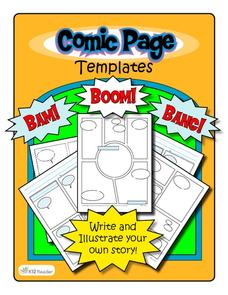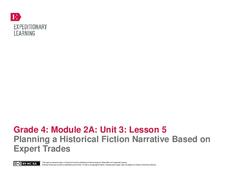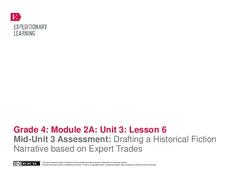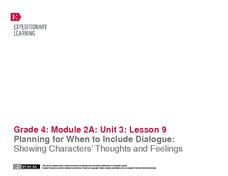Michigan State University
Create an Animal
Think beyond the animals and habitats we've already discovered and allow scholars to dream up their very own habitat and an animal that lives there. Class members present the new habitat and animal on a poster alongside an...
Museum of Tolerance
Family Role Model Activity
What does is take to be a role model? Through grand conversation, and the use of books and a graphic organizer, scholars find out and apply the requirements to identify a role model within their family. They then journey through the...
Curriculum Corner
Observational Drawing
What shall we write about today? The opportunities are endless with a printable that offers space to write and draw a corresponding picture.
Curriculum Corner
Writing Prompts
Five questions and pictures make up a collection of writing assignments that spark imagination and reinforce creative writing skills. Class members respond to each question based on their observations of each picture.
Civil War Trust
The Common Civil War Soldier
Imagine you are a soldier in the Civil War. What are you wearing? What do you need to carry with you? Examine the life of a person during the Civil War, from drummer boys to powder monkeys to musket-toting soldiers. Elementary learners...
K12 Reader
Comic Page Templates
Looking for a set of comic strip templates? Use a resource with five comic templates complete with writing frames and text bubbles. Not only is it a great tool to have on hand in the classroom, but especially when working on narrative...
Houghton Mifflin Harcourt
Writing Prompts for Middle School
Scratching your head when it comes to engaging writing prompts? Check out a list of prompts designed for middle school classes, which includes topics for persuasive writing, expository writing, how-to essays, personal narratives, and...
McGraw Hill
Writing Prompts, Student Rubrics, and Sample Responses
Whether you are teaching mainstream, advanced, or intervention language arts classes, you will find something helpful in a thorough writing packet. It includes prompts, rubrics, responses, helpful hints, graphic organizers, and many...
Oklahoma State Department of Education
Narrative Prompt
Reading about history is nothing like experiencing it firsthand. Encourage your eighth graders to do the next best thing with a historical narrative prompt, in which they describe the experience of a first-time traveler on the...
Fisher Reyna Education
Personal Narrative Writing Prompts
Looking for stimulating writing prompts that won't make young writers cringe? A set of five personal narrative writing prompts engages pupils in analyzing, thinking, connecting, and writing about particular topics. Each prompt begins...
East Side Union High School District
Biographical Narrative: Journal Prompts
The opportunities are endless with a worksheet containing 24 biographical narrative writing prompts. Although there are no directions or specifications for the writing process, the prompts promote the use of narrative writing techniques...
EngageNY
Preparing to Write Historical Fiction: Determining Characteristics of the Genre
A language arts instructional activity helps young writers identify elements that make up historical fiction. First, it guides them through elements of fictional pieces with vocabulary cards. Then, pupils work collaboratively to...
EngageNY
Planning Ideas: Developing a Colonial Character Profile
The second lesson in a historical fiction series encourages pupils to develop a character profile of a colonial person using research acquired in the previous unit. Learners prepare their historical fiction narrative by responding to a...
EngageNY
Practice Planning a Historical Narrative: The Wheelwright
Fourth graders use a four-square graphic organizer to plan a paragraph writing about a wheelwright. Using gathered research from the previous unit, young writers discover how to organize a plot in preparation for writing a historical...
EngageNY
Planning a Historical Fiction Narrative Based on Expert Trades
Pupils plan for a historical fiction narrative based on their previous research on expert trades from the Colonial Era. Individuals use the four-square graphic organizer to organize the information they want to be detailed in their four...
EngageNY
Drafting a Historical Fiction Narrative: The Wheelwright
Young writers use the four-square graphic organizer to draft their historical fiction narratives' first, second, third, and fourth paragraphs on the wheelwright. The instructional activity promotes discussion and modeling of what makes a...
EngageNY
Mid-Unit 3 Assessment: Drafting a Historical Fiction Narrative Based on Expert Trades
Young historians use their planning graphic organizer to prepare a personal narrative draft on expert trades. Since the instructional activity is considered the mid-unit assessment, learners respond to a writing prompt related to the...
EngageNY
Revising for Organization: Timely Transitions
During the eighth lesson in a historical fiction unit, pupils practice thoughtfully transitioning their ideas sequentially. After the teacher models how to add these transitions using the Wheelwright draft created in a previous lesson,...
EngageNY
Revising for Organization and Style: Bold Beginnings
Get young writers thinking about how to write a great beginning for their narratives. After examining examples of solid beginnings in literary text, young writers discuss the criteria for a compelling introduction. Then, independently,...
EngageNY
Writing Dialogue: Revising Historical Narrative Drafts to Add Dialogue
Young writers have written, revised, and peer-edited their historical fiction narratives by the 10th lesson plan in a language arts unit. Fourth graders finally combine their revision notes to create a second draft. The double-spaced...
EngageNY
Planning for When to Include Dialogue: Showing Characters’ Thoughts and Feelings
Young writers examine dialogue conventions, including indentation, quotation marks, and expressing thoughts and feelings through a fictional text. By noticing where and when authors use dialogue, they decide how to incorporate dialogue...
EngageNY
Revising for Organization and Style: Exciting Endings
Young writers compose a gripping ending to their historical fiction narratives. Following the previous lesson plan, where learners wrote a bold beginning, class members examine exciting endings from a literary text. They then draft their...
EngageNY
Peer Critique for Organization and Style
Put another set of eyes on your class's historical fiction narratives with one of the final lessons in the unit. Fourth graders use feedback from their peers to annotate their drafts for revision, particularly their bold beginnings and...
EngageNY
Reviewing Conventions and Editing Peers’ Work
Encourage young writers to edit text based on conventions. After reviewing the conventions, fourth graders watch a teacher demonstrate how to revise a paragraph for correct spelling, capitalization, punctuation, or dialogue. Then, pairs...

























